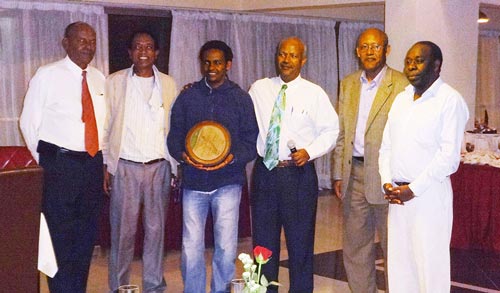By Florence Sipalla/CIMMYT
The Drought Tolerant Maize for Africa (DTMA) project recognized country teams that demonstrated excellence in breeding and disseminating drought-tolerant maize varieties during the Regional Maize Working Group (MWG) meeting held in Addis Ababa, Ethiopia, from 17 to 19 February.
For the third time since 2011, Uganda’s National Agricultural Research Organization (NARO) won the breeding award while breeders from the Ethiopian Institute of Agricultural Research (EIAR) came in second. The Uganda team, comprised of partners from the public and private sector, also won the prize for disseminating drought-tolerant maize varieties, a category in which the Tanzania team came in second.
The combined efforts of the national agriculture research institutes and the seed companies were recognized. The awards were given after a systematic evaluation of the breeding and dissemination programs in the participating countries. “The strength of breeding programs was assessed based on existence of short-, intermediate- and long-term objectives,” said DTMA administrator Kimani Kamau. Kamau cited as selection criteria the layout and management of trials, inbred line development, testing of new hybrids and open-pollinated varieties and efficient use of germplasm from regional and international testing programs. “Efficient use of appropriate software in managing and analyzing trial data and the existence of a clear framework showing how the seed would reach the farmers was also considered,” Kamau added.

Finally, teams were also assessed on institutional representation, variety registration and release, certified seed production, companies that had taken up and were promoting drought-tolerant maize varieties and awareness building activities and events. The winning teams received plaques and certificates presented to individual members by a team led by DTMA project leader Tsedeke Abate, assisted by Aberra Debelo, Sasakawa – Global 2000 country director for Ethiopia; Stephen Njoka, director of the Kenya Agricultural Research Institute (KARI) Embu; and Alemayehu Mekonnen, a commercial farmer. “It is good to be appreciated and recognized for the work we are doing,” said Godfrey Asea, crop breeder and cereal research leader at the National Crops Resources Research Institute (NaCRRI) and the Uganda Maize Working Group chair. “We are happy the breeding work is also translating into products to improve farmers’ incomes and food security.”
The breeders indicated that they still face challenges in increasing farmers’ productivity because of the high costs of inputs and fertilizer. The team’s efforts in disseminating drought-tolerant maize varieties are backed by research. According to a recent adoption survey coordinated by the socioeconomics team, the adoption of drought-tolerant maize between 2007 and 2013 was at 28 percent. “The survey indicated that a total of 83 percent of households had adopted drought-tolerant varieties including those developed before 2007 and varieties developed during the current phase of the DTMA project,” said CIMMYT socioeconomist Monica Fisher.
These statistics are derived from a survey carried out on a sample of 400 maize farmers in four districts in Uganda where DTMA seed has been disseminated. The Ugandan team credits their success in disseminating the drought-tolerant varieties to a combination of factors. “Farmers have quickly adopted drought-tolerant maize seed as they have seen its response to climate change,” said Cliff-Richard Masagazi, managing director for Pearl Seeds. “We have the advantage of having two maize seasons which enables us [seed companies] to quickly build seed volumes and move them.” The strong partnership among researchers, nongovernmental organizations (NGOs) and seed companies also enables them to reach more farmers. Masagazi said NGOs were instrumental in enabling the seed companies to reach more farmers in different parts of the country.
“The struggle still continues,” said Hillary Rugema, Sasakawa-Global 2000 coordinator for crop productivity improvement, an NGO partner. “We shall keep reaching out to bring more farmers and partners on board.” “We appreciate the consistent support and recognition from CIMMYT,” said Gezagn Bogale, EIAR maize breeder based in Melkassa, Ethiopia, whose team won the breeding award from 2007 to 2010. Bogale also thanked CIMMYT for providing his team with tablets that would allow them to digitize data collection on the breeding trials. “This encourages us to work hard in the future.”
 Climate adaptation and mitigation
Climate adaptation and mitigation